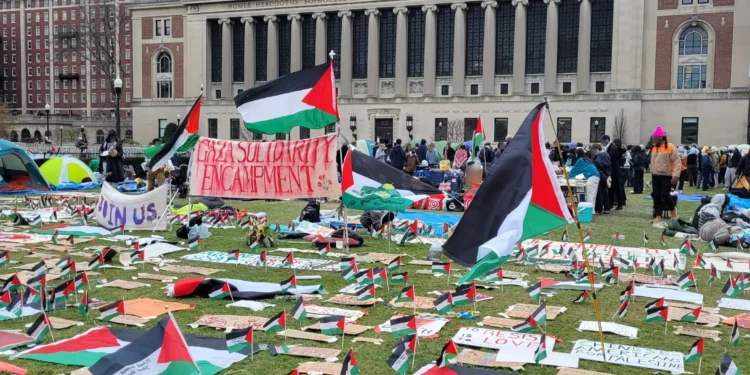Brussels (Brussels Morning) – Pro-Palestinian student demonstrations have rocked academic institutions in the US and now, students at Belgian universities intend to show their support for the people of Gaza.
Students at Ghent University (UGent) occupied campus on Monday morning and are asking the Board of Directors to cut relations with Israel as well as make stronger obligations to the green transition. Student organisations ‘End Fossil Ghent’ and ‘Ghent Students for Palestine‘ have joined strengths to protest what they regard as “hypocrisy” from the university concerning both human rights and sustainability.
What demands are being made by the protesters at Ghent University?
In a note sent to the Board of Directors on 24 April, signatories questioned the institution to outline two “time-bound action plans”: one detailing methods to “cut all collaborations with Israeli institutions complicit in the ongoing ethnic cleansing of Palestinians”, and another set out “effective and binding action to implement [the university’s] 2030 transition plans”.
The Board of Directors failed to answer to their demands by Friday 3 May and occupation of the campus started on Monday as a result.
“We are uniting because we want to call out the hypocrisy of UGent,” Joelle (25), Erasmus student and member of ‘Ghent Students for Palestine’, said. “They say they are a socially just university that believes in human rights, but they are not standing against Israel or condemning the genocide.” “They are also not investing in sustainability, budget-wise or education-wise,” added Siska (23), a Masters student and member of ‘End Fossil Ghent’.
Why did the Board of Directors fail to respond to student demands?
A different open letter signed by over 400 students and faculty members voices “deep shock” at the Board of Directors’ decision to bypass the Human Rights Commission’s advice to sever links with Israeli institutions. “The silence and lack of transparency concerning the Palestinian genocide are in sharp distinction to the open condemnation of the Russian invasion of Ukraine,” they said, adding that they support the action. “Systems of oppression are connected and therefore our actions against them need to be interconnected,” the students demonstrated. “Supporting Palestine is a climate issue within itself.”
What environmental concerns are raised by students during the campus occupation?
The student body at UGent has noticed a progressive slowdown in the university’s environmental ambitions. Energy consumption on campus has prevented the institution from staying on track to decrease emissions by 2030 and no actions implemented to mitigate this.
In addition, UGent’s energy-saving policies no longer align with the 1.5°C target set out in the 2015 Paris Agreement, nor the EU’s 2°C target. Students state that the university’s savings policies are “unsustainable and anti-social,” suggesting to a reduction in vegetarian canteen options as one issue.
How has UGent’s response to the Palestinian crisis been criticized by protesters?
Furthermore, the institution has taken little action in defence of human rights in Gaza, where thousands of civilians have been wounded or killed by the Israeli military. The protesters denounce endeavours to “outsource” decision-making on the issue to the Committee on Human Rights and Dual Use Research. They contend that by failing to cut ties with Israeli organisations, UGent has allowed “suicide” (all universities in Gaza have been destroyed by Israeli bombardments since October 2023).
The campus occupation will stay for at least three days, until Wednesday 8 May. “We are well organised, committed and hopeful,” Siska stated. “But we are also angry that we have to do this in the first place. So far, UGent has not heard our demands but this is our way of making sure we are not left on the sidelines of the decision-making process.”




